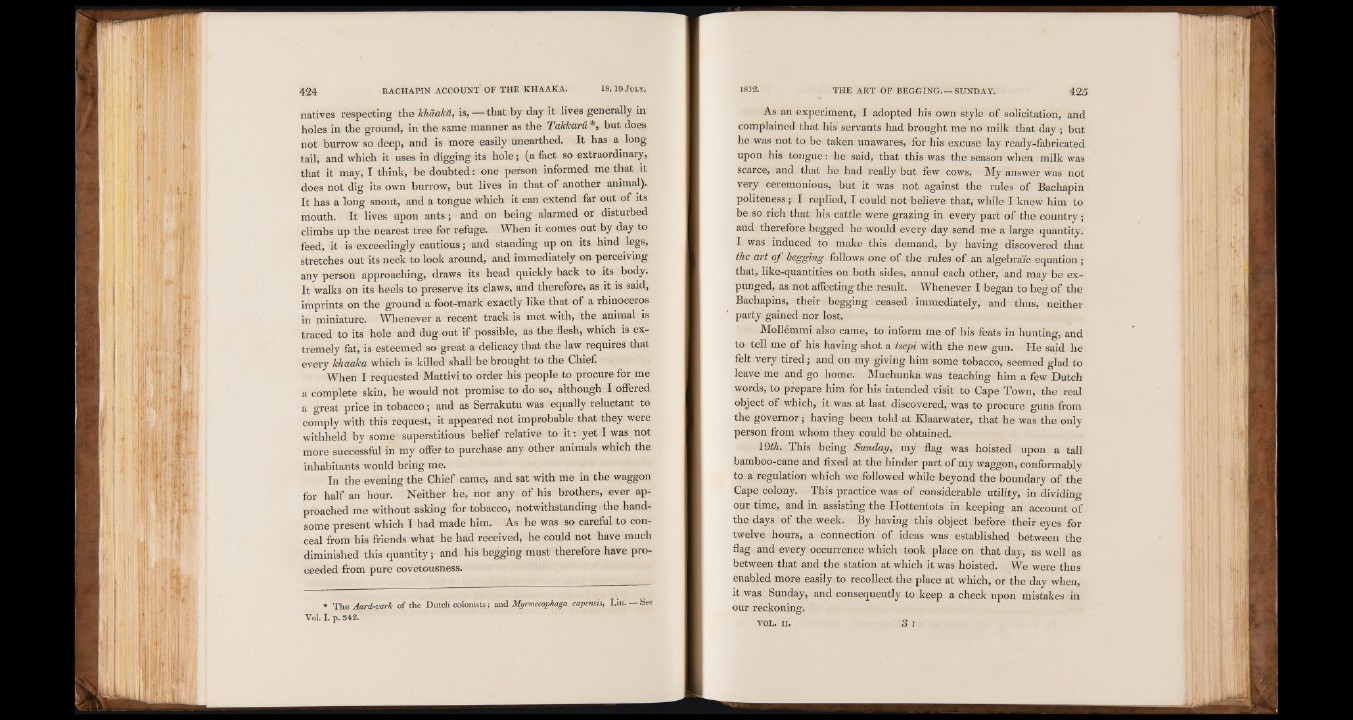
natives respecting the Jchaakd, is,— that by day it lives generally in
holes in the ground, in the same manner as the Takkarú *, but does
not burrow so deep, and is more easily unearthed. It has a long
tail, and which it uses in digging its hole; (a fact so extraordinary,
that it may, I think, be doubted: one person informed me that it
does not dig its own burrow, but lives in that of another animal).
It has a long snout, and a tongue which it can extend far out of its
mouth. It lives upon ants; and on being alarmed or disturbed
climbs up the nearest tree for refuge. When it comes out by day to
feed, it is exceedingly cautious; and standing up on its hind legs,
stretches out its neck to look around, and immediately on perceiving
any person approaching, draws its head quickly back to its body.
It walks on its heels to preserve its claws, and therefore, as it is said,
imprints on the ground a foot-mark exactly like that of a rhinoceros
in miniature. Whenever a recent track is met with, the animal is
traced to its hole and dug out if possible, as the flesh, which is extremely
fat, is esteemed so great a delicacy that the law requires that
every khaaka which is killed shall be brought to the Chief.
When I requested Mattivi to order his people to procure for me
a complete skin, he would not promise to do so, although I offered
a great price in tobacco; and as Serrakutu was equally reluctant to
comply with this request, it appeared not improbable that they were
withheld by some superstitious belief relative to it: yet i was not
more successful in my offer to purchase any other animals which the
inhabitants would bring me.
In the evening the Chief came, and sat with me in the waggon
for half an hour. Neither he, nor any of his brothers, ever approached
me without asking for tobacco, notwithstanding the handsome
present which I had made him. As he was so careful to conceal
from his friends what he had received, he could not have much
diminished this quantity; and his begging must therefore have proceeded
from pure covetousness.
* The Aardrvark of the Dutch colonists; and Myrmecophaga capensis, Lin. — See
Vol. I. p. 342.
As an experiment, I adopted his own style of solicitation, and
complained that his servants had brought me no milk that day ; but
he was not to be taken unawares, for his excuse lay ready-fabricated
upon his tongue: he said, that this was the season when milk was
scarce, and that he had really but few cows. My answer was not
very ceremonious, but it was not against the rules of Bachapin
politeness; I replied, I could not believe that, while I knew him to
be so rich that his cattle were grazing in every part of the country;
and therefore begged he would every day send me a large quantity.
I was induced to make this demand, by having discovered that
the art of begging follows one of the rules of an algebraic equation;
that, like-quantities on both sides, annul each other, and may be expunged,
as not affecting the result. Whenever I began to beg of the
Bachapins, their begging ceased immediately, and thus, neither
party gained nor lost.
Mollemmi also came, to inform me of his feats in hunting, and
to tell me of his having shot a tsepi with the new gun. He said he
felt very tired; and on my giving him some tobacco, seemed glad to
leave me and go home. Muchunka was teaching him a few Dutch
words, to prepare him for his intended visit to Cape Town, the real
object of which, it was at last discovered, was to procure guns from
the governor; having been told at Klaarwater, that he was the only
person from whom they could be obtained.
19th. This being Sunday, my flag was hoisted upon a tall
bamboo-cane and fixed at the hinder part of my waggon, conformably
to a regulation which we followed while beyond the boundary of the
Cape colony. This practice was of considerable utility, in dividing
our time, and in assisting the Hottentots in keeping an account of
the days of the week. By having this object before their eyes for
twelve hours, a connection of ideas was established between the
flag and every occurrence which took place on that day, as well as
between that and the station at which it was hoisted. We were thus
enabled more easily to recollect the place at which, or the day when,
it was Sunday, and consequently to keep a check upon mistakes in
our reckoning.
V O L . I I . 3 i